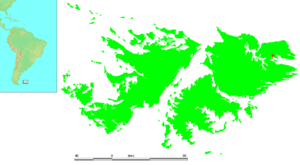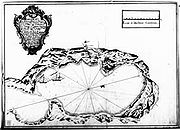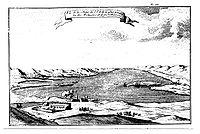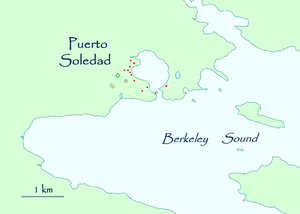
Port Louis, Falkland Islands
Encyclopedia

East Falkland
East Falkland the largest of the Falkland Islands in the South Atlantic, has an area of and a coastline long. Most of the population of the Falklands live in East Falkland, almost all of them living in the northern half of the island...
. It was established by Louis de Bougainville in 1764 as the first French
French people
The French are a nation that share a common French culture and speak the French language as a mother tongue. Historically, the French population are descended from peoples of Celtic, Latin and Germanic origin, and are today a mixture of several ethnic groups...
settlement on the islands, but was then transferred to Spain
Spain
Spain , officially the Kingdom of Spain languages]] under the European Charter for Regional or Minority Languages. In each of these, Spain's official name is as follows:;;;;;;), is a country and member state of the European Union located in southwestern Europe on the Iberian Peninsula...
in 1767 and renamed Puerto Soledad (In Spanish, East Falkland is known as Isla Soledad).

History


Puerto Soledad
Puerto Soledad was a Spanish military outpost and penal colony on the Falkland Islands, situated at an inner cove of Berkeley Sound .-Port St...
upon the Spanish take over. Vernet reverted to a Spanish version of the original name when he formed his settlement, Puerto Luis. The British renamed the settlement Anson's Harbour for a while before reverting once more to the original French name, Port Louis.
For a time, the town became the Spanish
Spain
Spain , officially the Kingdom of Spain languages]] under the European Charter for Regional or Minority Languages. In each of these, Spain's official name is as follows:;;;;;;), is a country and member state of the European Union located in southwestern Europe on the Iberian Peninsula...
capital of the islands, which were claimed by Spain and administered as part of the Viceroyalty of the Río de la Plata
Viceroyalty of the Río de la Plata
The Viceroyalty of the Río de la Plata, , was the last and most short-lived Viceroyalty of the Spanish Empire in America.The Viceroyalty was established in 1776 out of several former Viceroyalty of Perú dependencies that mainly extended over the Río de la Plata basin, roughly the present day...
(though having their own governor). The Spanish removed the governor in 1806 abandoned the settlement in 1811.
In October 1820, following damage to his ship Heroína
Heroina
The Heroína was a privately owned frigate that was operated as a privateer under a license issued by the United Provinces of the River Plate . It was under the command of American-born Colonel David Jewett and has become linked with the Argentine claim to sovereignty of the Falkland Islands...
in a storm, Colonel David Jewett
David Jewett
Colonel David Jewett is a notable figure in the history of the sovereignty dispute between Great Britain and Argentina as he commanded the Frigate Heroína that visited the Falkland Islands in 1820 and raised the first Argentine flag on the islands....
was forced to put into the islands to shelter in Puerto Soledad
Puerto Soledad
Puerto Soledad was a Spanish military outpost and penal colony on the Falkland Islands, situated at an inner cove of Berkeley Sound .-Port St...
. This was the culmination of a disastrous eight-month voyage that saw a mutiny
Mutiny
Mutiny is a conspiracy among members of a group of similarly situated individuals to openly oppose, change or overthrow an authority to which they are subject...
and most of his crew disabled by scurvy
Scurvy
Scurvy is a disease resulting from a deficiency of vitamin C, which is required for the synthesis of collagen in humans. The chemical name for vitamin C, ascorbic acid, is derived from the Latin name of scurvy, scorbutus, which also provides the adjective scorbutic...
and other diseases. While in harbour, there was another attempt at mutiny
Mutiny
Mutiny is a conspiracy among members of a group of similarly situated individuals to openly oppose, change or overthrow an authority to which they are subject...
by the crew who wished to return to Buenos Aires
Buenos Aires
Buenos Aires is the capital and largest city of Argentina, and the second-largest metropolitan area in South America, after São Paulo. It is located on the western shore of the estuary of the Río de la Plata, on the southeastern coast of the South American continent...
. With many of his crew disabled by scurvy, Jewett sought the assistance of the British Antarctic explorer James Weddell
James Weddell
James Weddell was a British sailor, navigator and seal hunter who in the early Spring of 1823 sailed to latitude of 74°15' S and into a region of the Southern Ocean that later became known as the Weddell Sea.-Early life:He entered the merchant service very...
in preparing his ship for sea once more.
On 6 November 1820, Jewett raised the flag of the United Provinces of the River Plate (now Argentina
Argentina
Argentina , officially the Argentine Republic , is the second largest country in South America by land area, after Brazil. It is constituted as a federation of 23 provinces and an autonomous city, Buenos Aires...
) at Port Louis. Weddell witnessed the ceremony and expressed the view that, as Jewett had only put into harbour for repair and provisions, the event was intended to secure an exclusive claim to the wreck of the French ship Uranie that had foundered at the entrance of Berkeley Sound
Berkeley Sound
Berkeley Sound is an inlet, or fjord in the north east of East Falkland in the Falkland Islands. The inlet was the site of the first attempts at colonisation of the islands, at Port Louis, by the French....
a few months previously.
After resting in the islands and repairing his ship, Jewett returned to Buenos Aires.
Luis Vernet
In 1823, the United Provinces of the River Plate granted fishing rights to Jorge Pacheco and Luis VernetLuis Vernet
Luis Vernet was a merchant from Hamburg of Huguenot descent. Vernet established a settlement on East Falkland in 1828, after first seeking approval from both the British and Argentine authorities. As such, Vernet is a controversial figure in the history of the Falkland Islands sovereignty dispute...
. The partnership of Pacheco and Vernet did not last, with Vernet forming a new company in 1825. An expedition in 1826 proved to be a failure; sailings to the Islands were disrupted by a Brazilian blockade and the boggy terrain of the Islands prevented the Gauchos catching wild cattle in their traditional way.
In 1828, the United Provinces of the River Plate granted Vernet all of East Falkland together with exclusive fishing and sealing rights. Included in the grant was a clause that provided a colony was established within three years, it would be exempt from taxes. Settling in the former Spanish capital of Puerto Soledad, Vernet reverted to the use of its original name Puerto Luis. By 1831, the colony was well established and advertising for new colonists, although the Lexingtons report (see below) suggests that the conditions on the islands were quite miserable. The colony was largely archaic, and the Argentine government hoped that Vernet's appointment would bolster the economic and political status of the colony, given his extensive business operations.
Vernet was well aware of British claims to the islands. Prior to both the 1826 and 1828 expedition, he approached the British consulate with the grant of the United Provinces of the River Plate and obtained their stamp. While visiting the consulate, he expressed the wish that if the British returned they would take his colony under their protection. Vernet also provided written reports on the suitability of the Islands for the British Government.
Vernet used Puerto Soledad/Puerto Luis as a seal hunting base. The United Provinces of the River Plate granted him a monopoly in the islands and he curbed sealing by others. Vernet later seized the American
United States
The United States of America is a federal constitutional republic comprising fifty states and a federal district...
ship Harriet for breaking the restrictions on seal hunting. Property on board the ship was seized and the captain was returned to Buenos Aires to stand trial. Vernet also returned for the trial. The American Consul in the United Provinces of the River Plate protested the actions by Vernet, stating that the United States did not recognise its sovereignty in the Falklands. The consul dispatched the warship USS Lexington
USS Lexington (1825)
The second USS Lexington was a sloop in the United States Navy built at the New York Navy Yard in Brooklyn, New York, in 1825; and commissioned on 11 June 1826, Master Commandant William B. Shubrick in command....
to Puerto Luis to retake the confiscated property, as well as the Superior and Breakwater which had also been seized. The Lexington destroyed the guns and powder of Puerto Luis in 1832, an act later condoned by the American ambassador in Buenos Aires, who declared the Falkland Islands to be res nullius
Res nullius
Res nullius is a Latin term derived from Roman law whereby res is not yet the object of rights of any specific subject. Such items are considered ownerless property and are usually free to be owned...
("free from any power"). Forty settlers took the opportunity to leave on board the Lexington, leaving twenty-four behind.
Re-establishment of British rule on the Falklands

Charles Darwin
Charles Robert Darwin FRS was an English naturalist. He established that all species of life have descended over time from common ancestry, and proposed the scientific theory that this branching pattern of evolution resulted from a process that he called natural selection.He published his theory...
visited from HMS Beagle
HMS Beagle
HMS Beagle was a Cherokee-class 10-gun brig-sloop of the Royal Navy. She was launched on 11 May 1820 from the Woolwich Dockyard on the River Thames, at a cost of £7,803. In July of that year she took part in a fleet review celebrating the coronation of King George IV of the United Kingdom in which...
. He commented that:
- After the possession of these miserable islands had been contested by France, Spain, and England, they were left uninhabited. The government of Buenos Aires then sold them to a private individual, but likewise used them, as old Spain had done before, for a penal settlement. England claimed her right and seized them. The Englishman who was left in charge of the flag was consequently murdered. A British officer was next sent, unsupported by any power: and when we arrived, we found him in charge of a population, of which rather more than half were runaway rebels and murderers. (The Voyage of the BeagleThe Voyage of the BeagleThe Voyage of the Beagle is a title commonly given to the book written by Charles Darwin and published in 1839 as his Journal and Remarks, bringing him considerable fame and respect...
.)
Admiral George Grey conducted a survey of the islands in 1836, and his view was a little more positive. In November 1846 he wrote:
- Today the weather was beautiful and Port Louis or Solidad [sic] seen to advantage as soon as I had finished my breakfast I landed in company with the Governor to inspect the state of his little Colony, which is situated overlooking a small basin or inner harbour, the principal house of which is that inhabited by Lieut. Smith and among the miserable huts by which it is surrounded looks respectable by comparison, it is white-washed, has a flag staff before it and looks like a preventative station on the coast of NorthumberlandNorthumberlandNorthumberland is the northernmost ceremonial county and a unitary district in North East England. For Eurostat purposes Northumberland is a NUTS 3 region and is one of three boroughs or unitary districts that comprise the "Northumberland and Tyne and Wear" NUTS 2 region...
.
After they transferred the administration to Stanley
Stanley, Falkland Islands
Stanley is the capital and only true cityin the Falkland Islands. It is located on the isle of East Falkland, on a north-facing slope in one of the wettest parts of the islands. At the 2006 census, the city had a population of 2,115...
in 1845, it became the quiet sheep farming settlement it is today, known for its nineteenth century houses, waterfowl
Waterfowl
Waterfowl are certain wildfowl of the order Anseriformes, especially members of the family Anatidae, which includes ducks, geese, and swans....
and wading bird
Wader
Waders, called shorebirds in North America , are members of the order Charadriiformes, excluding the more marine web-footed seabird groups. The latter are the skuas , gulls , terns , skimmers , and auks...
s.
See also
- Origins of Falkland IslandersOrigins of Falkland IslandersFalkland Islanders derive from various origins. Chief among these are the numerically small but internationally diverse early 19th century inhabitants of the Falkland Islands, comprising and descended in part from settlers brought by Luis Vernet, and English and American sealers; South American...
- Puerto SoledadPuerto SoledadPuerto Soledad was a Spanish military outpost and penal colony on the Falkland Islands, situated at an inner cove of Berkeley Sound .-Port St...
- Re-establishment of British rule on the Falklands (1833)

